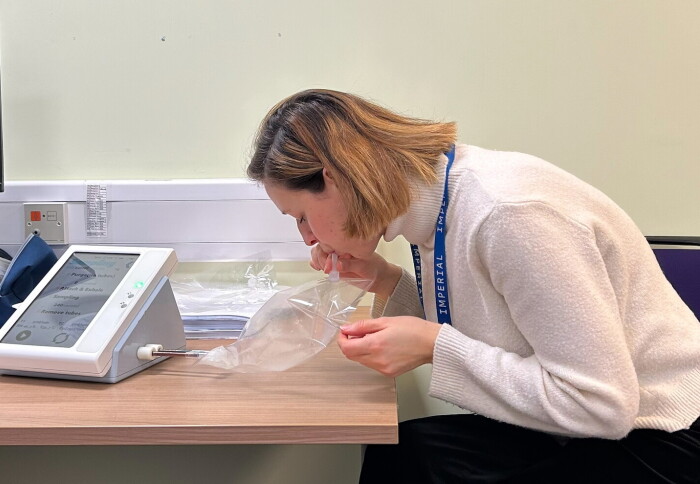Redefining the value of diagnostics technologies in healthcare

A new study introduces a novel framework for evaluating the value of diagnostic technologies in healthcare.
"Our work redefines the value proposition for diagnostic technology by moving beyond cost effectiveness." Dr Tayana Soukup Research Fellow in Human Factors, Department of Surgery & Cancer
Traditionally, the "value proposition" concept—commonly used in business—has lacked a clear definition within the healthcare sector, particularly concerning diagnostic tools. This research aims to bridge that gap by providing a comprehensive understanding of the unique benefits these technologies offer.
This innovative research, driven by a team science approach and led by members of the Department of Surgery and Cancer and the NIHR HealthTech Research Centre in In Vitro Diagnostics, was published in Frontiers in Medicine.
The study identified several challenges in assessing the value of diagnostic technologies:
- Ambiguous Definitions: Existing interpretations often overlook critical aspects such as patient outcomes and operational efficiencies.
- Measurement Difficulties: Capturing both tangible benefits (like cost-effectiveness) and intangible ones (such as enhanced clinical decision-making) presents significant hurdles.
- Diverse Stakeholder Perspectives: Integrating views from clinicians, industry experts, patients, and policymakers is essential yet complex.
A team science approach
The researchers employed a multidisciplinary approach, engaging experts from various fields to redefine the value proposition for diagnostic tools. They discovered that the true value extends beyond mere cost considerations, encompassing improved patient care, better decision-making, and streamlined workflows. This comprehensive perspective led to the development of a flexible, evidence-based definition adaptable to the evolving needs of healthcare.
Speaking about the study’s team-based approach, Dr Tayana Soukup, Research Fellow in Human Factors in the Department of Surgery & Cancer and joint first-author, said: “Our work redefines the value proposition for diagnostic technology by moving beyond cost-effectiveness. We embrace a holistic, cross-disciplinary approach that integrates improved patient outcomes, enhanced operational efficiencies, and the collective insights of diverse stakeholders. In our view, crafting a compelling value proposition is itself a team science endeavour.
“The collective intelligence of researchers, clinicians, engineers, technicians, patients, policymakers and industry is required to successfully conceptualise and convey how a diagnostic innovation can improve care, outcomes, and resource stewardship. By uniting these perspectives early and often, teams can incubate and accelerate diagnostics toward meaningful impact at both local and system-wide levels."

Creating clarity
By establishing a clearer value proposition, healthcare providers and innovators can more effectively communicate the benefits of new diagnostic technologies. This clarity could result in enhanced patient care, more efficient resource utilisation, and increased investment in innovations addressing real healthcare challenges. Ultimately, this approach has the potential to transform how diagnostics are adopted and utilised across the healthcare system.
Professor George Hanna, Head of the Department of Surgery and Cancer and senior author, emphasised the significance of this study, stating: "As a surgeon, I see daily how critical robust diagnostic tools are for delivering effective patient care. This study reshapes our understanding of diagnostic innovation by fusing clinical insights with rigorous, multidisciplinary collaboration. Our approach ensures that we consider every facet, from clinical outcomes and operational efficiency to economic viability, when developing new diagnostics. This integrated perspective not only advances our field but also sets a new standard for how innovations can drive better care and more efficient resource use across the healthcare system."
Professor Peter Buckle, Principal Research Fellow in Human Factors in the Department of Surgery & Cancer and co-author, said: "Diagnostic innovations can help patients, clinicians and others make better decisions about care and treatment interventions. Understanding how such innovations change the real world of health systems and how, or if, they are considered valuable has demanded a fresh look. This novel paper provides a clear framework for studying this using a human-focused systems approach."
Dr Maria Bernarda Zamora Talaya, Research Fellow in Health Economics in the Department of Surgery & Cancer and joint first-author, said: "While there is widespread recognition of the value of diagnostics, there is still limited measurement and reward of this value. This has resulted in a two-speed inclusion of value elements: therapeutics lead the inclusion of novel elements of value and their recognition by regulators and payers. This leaves diagnostics stuck in the traditional measurement of costs and short-term clinical outcomes, or subsidiary to therapies as companion diagnostics."
This study represents a significant step toward a more nuanced and comprehensive assessment of diagnostic technologies, paving the way for innovations that can meet the complex demands of modern healthcare.
Defining the value proposition in diagnostic technology: challenges and opportunities for its understanding and development – a review with a multiperspective reflective analysis. Tayana Soukup, Bernarda Zamora-Talaya, Shayan Bahadori, Rosario Luxardo, Patrick Kierkegaard, Omar Butt, Hannah Kettley-Linsell, Katerina-Vanessa Savva, Massimo Micocci, Shanshan Zhou, Simon Newman, Simon Walne, Christopher J. Peters, Adam Gordon, Melody Ni, Peter Buckle, George B. Hanna and NIHR HRC IVD PPIE Team. Frontiers in Medicine, 2025.
Article text (excluding photos or graphics) © Imperial College London.
Photos and graphics subject to third party copyright used with permission or © Imperial College London.
Reporter
Benjie Coleman
Department of Surgery & Cancer